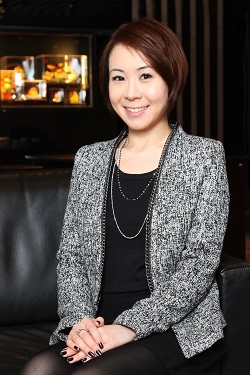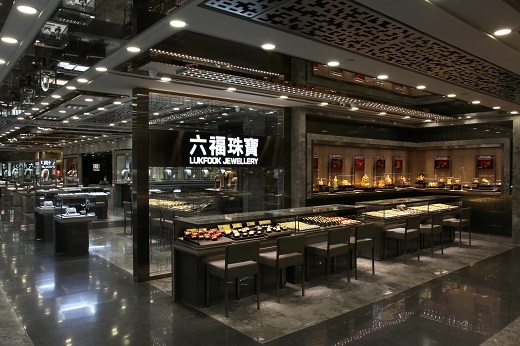|
|
Luk Fook Adapts Strategy to Restore Growth
Five-minute Interview: Nancy Wong
Nov 24, 2016 10:45 AM
By Avi Krawitz
|
|
|
RAPAPORT... Luk Fook, like many of its peers in the region, continues to report double-digit sales declines as it navigates China's economic slowdown and ensuing drop in tourism to Hong Kong. With its interim results published November 24, the company is rethinking its operations. Nancy Wong, an executive director at Luk Fook (pictured below), explained to Rapaport News the strategy includes assessing its optimum store locations and product mix in the current challenging environment.
Rapaport News: How has the market been in 2016?

Wong: Sentiment in Hong Kong improved from August – maybe because tourism has picked up a bit. Tourists have been going to South Korea, Japan and Europe, but we now hear it’s becoming more difficult to get a visa for some of these countries, and that should work in our favor.
However, sales growth is still negative and the market is weak, especially in Hong Kong. China is a little better - we’ve had positive same-store sales growth for gem-set jewelry there.
The difficult economic environment has pushed people into buying smaller diamonds and lower value items. This could be a positive trend because, in the past, only the wealthiest bought diamonds. Now we see people are buying pendants and rings for everyday wear - so the distribution is healthier and more sustainable.
Rapaport News: Has the slowdown prompted you to consolidate your store network?
Wong: We have 47 stores in Hong Kong and 11 in Macau. We’re trying to relocate shops from tourist areas to residential. Traditional tourist areas such as Causeway Bay and Mongkok have been hit by the drop in tourism as Chinese visitors who used to stay there now prefer residential areas closer to the border. We want to optimize our network rather than reduce the number of stores.
In Mainland China, we used to add more than 100 net stores each year, but we opened 45 in the last financial year and we’re targeting 50 this year. We’ve scaled down our expansion in China but we’re still growing because the market is still big. We have more than 1,300 shops in China and see a significant room for expansion.
If you look at our gem-set jewelry sales in China, it shows that more people are spending on lower ticket items. The quantity is actually up, while the same-store sales value is down. That means people are still spending.
Rapaport News: How has the weaker market affected your inventory requirements?
Wong: We reduced our inventory by almost $129 million (HKD 1 billion) between fiscal 2015 and 2016. The drop in Hong Kong was more severe than in China. Our gem-set jewelry sales in China have been doing well and so we’ve given the product more space, while we scaled back on gold.
Gem-set jewelry also gives us, on average, three times higher margin than gold. We have to consider that gold prices have been relatively high compared with the last two years when there was a gold rush amid a price correction. In 2016, there hasn’t been a trigger for customers to buy gold and that’s why we shifted our focus to gem-set jewelry.
Rapaport News: Do you feel the sales decline and jewelry market has bottomed out?
Wong: We thought that a long time ago. We felt when the stock market was booming in China it would spark a period when people would spend. But then all of a sudden the stock market dropped and sales continued to fall.
If this is the bottom we’ll be very happy. We’re also feeling pressure from high rentals in Hong Kong because we signed leases fairly recently. Some landlords are willing to cut the rental for a period but most expect you to commit to the contract.
Rapaport News: Have real-estate rentals come down?
Wong: When you renew your lease, yes. But they have come down in tourist areas only, from which we’re moving out. In the residential areas, they’re actually asking for higher rentals. They have the traffic so they have the bargaining power.
Rapaport News: How important are the respective Golden Weeks for your revenue?

Wong: Our busiest period tends to be from October to March, encompassing National Day, Christmas and the Chinese New Year. Lately, it’s been a little distorted because we had the gold rush in April 2013, and the sudden drop in the economic environment that had a detrimental effect. In Hong Kong, Christmas is actually the peak season, while in China and Macau it’s the Chinese New Year.
Rapaport News: What segment of the market are you targeting?
Wong: There are three major players in Hong Kong: Chow Tai Fook, Chow Sang Sang and Luk Fook, and we’re all targeting the mass market. Chow Tai Fook may be broader as they have a brand which is focused on the younger generation as well as diamonds and high-end watches for the very wealthy consumer. Chow Sang Sang has shifted to a slightly higher end.
We’re focused on the middle class. When purchasing a diamond product, many people will buy 1-carat or below, but not everyone will buy a larger size stone. There’s been a shift to lower price points. People are looking for quality in the color of diamonds, but are willing to compromise on clarity as that’s difficult to judge accurately with the naked eye.
Chinese consumers like pendants that are not expensive but look big. That’s why we have a lot of new designs where the diamond looks big but the piece is not very expensive. That’s what customers want these days.
Rapaport News: How important is the bridal market for you?
Wong: We are known for our bridal jewelry, not only in diamonds but in gold as well. Chinese tradition requires a bride to wear three pieces of gold so that’s central to our bridal collections. Of course, diamonds are important as well. In Hong Kong, engagement and bridal jewelry accounts for more than 50 percent of our diamond sales. While Bridal is the most important sales trigger, we have also noticed people tend to spend more around a birthday month, most likely for self-purchases.
Rapaport News: Explain your model of selling through licensee or self-operated stores?
Wong: All our stores in Hong Kong and Macau are self-operated, but in China and South Korea most of the stores are licensed.
China is an enormous country and every city has its own characteristics and particular taste. If you don’t know the right people, or the right location, it’s not going to work. The logic is that a licensee will know the local market very well. They know which shopping mall is going to be the best and they have the network to negotiate better terms. We leverage the licensee’s local knowledge with our brand name and that’s how we’ve expanded so fast in the last 20 years. Self-operated stores is more of a model for big cities like Beijing.
All the branding, store design, staff training and most of the collections are consistent across all our stores. We have a minimum inventory requirement, but licensees can also choose pieces that suit their requirements. For example, northern China might require bigger diamonds and the store will have more 1-carat stones, but in a tier III city, they’ll need more 0.30-carat diamonds. So we let the licensee lead the merchandising decisions.
Rapaport News: What messaging does your marketing focus on?
Wong: People are sometimes intimidated by jewelry stores, so we want to project a more warm-hearted and approachable image. Our TV commercials tend to be about warm-hearted stories of regular people and their daily lives rather than very beautiful or unapproachable models. When people come into our stores we want them to feel they’re coming home.
* Pictures courtesy Luk Fook. |
|
|
|
|
|
|
|
|
|
Tags:
Avi Krawitz, Chow Sang Sang, Chow Tai Fook, diamonds, Hong Kong, jewellery, Jewelry, Luk Fook, macau, Millennials, Nancy Wong, Rapaport
|
|
|
|
|
|
|
|
|
|
|

|
|